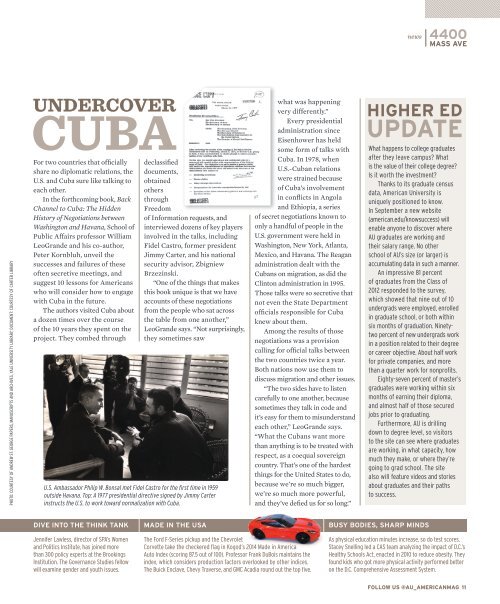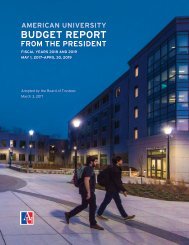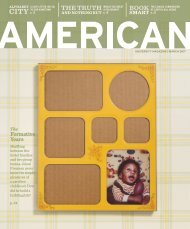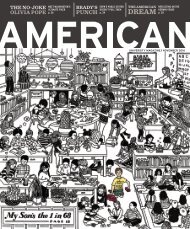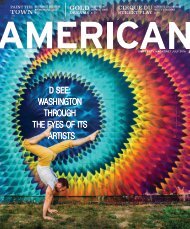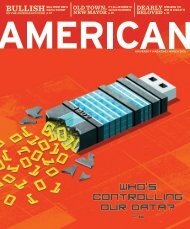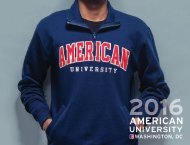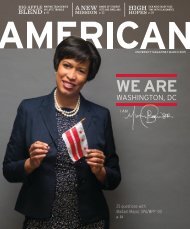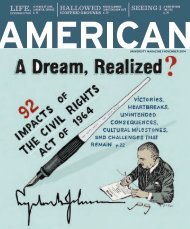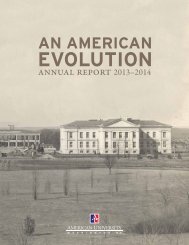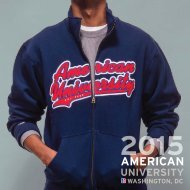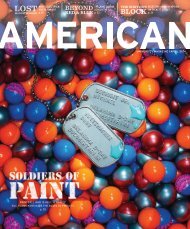American Magazine: August 2014
Create successful ePaper yourself
Turn your PDF publications into a flip-book with our unique Google optimized e-Paper software.
news<br />
PHOTO: COURTESY OF ANDREW ST. GEORGE PAPERS, MANUSCRIPTS AND ARCHIVES, YALE UNIVERSITY LIBRARY; DOCUMENT: COURTESY OF CARTER LIBRARY<br />
For two countries that officially<br />
share no diplomatic relations, the<br />
U.S. and Cuba sure like talking to<br />
each other.<br />
In the forthcoming book, Back<br />
Channel to Cuba: The Hidden<br />
History of Negotiations between<br />
Washington and Havana, School of<br />
Public Affairs professor William<br />
LeoGrande and his co-author,<br />
Peter Kornbluh, unveil the<br />
successes and failures of these<br />
often secretive meetings, and<br />
suggest 10 lessons for <strong>American</strong>s<br />
who will consider how to engage<br />
with Cuba in the future.<br />
The authors visited Cuba about<br />
a dozen times over the course<br />
of the 10 years they spent on the<br />
project. They combed through<br />
declassified<br />
documents,<br />
obtained<br />
others<br />
through<br />
Freedom<br />
of Information requests, and<br />
interviewed dozens of key players<br />
involved in the talks, including<br />
Fidel Castro, former president<br />
Jimmy Carter, and his national<br />
security advisor, Zbigniew<br />
Brzezinski.<br />
“One of the things that makes<br />
this book unique is that we have<br />
accounts of these negotiations<br />
from the people who sat across<br />
the table from one another,”<br />
LeoGrande says. “Not surprisingly,<br />
they sometimes saw<br />
U.S. Ambassador Philip W. Bonsal met Fidel Castro for the first time in 1959<br />
outside Havana. Top: A 1977 presidential directive signed by Jimmy Carter<br />
instructs the U.S. to work toward normalization with Cuba.<br />
what was happening<br />
very differently.”<br />
Every presidential<br />
administration since<br />
Eisenhower has held<br />
some form of talks with<br />
Cuba. In 1978, when<br />
U.S.-Cuban relations<br />
were strained because<br />
of Cuba’s involvement<br />
in conflicts in Angola<br />
and Ethiopia, a series<br />
of secret negotiations known to<br />
only a handful of people in the<br />
U.S. government were held in<br />
Washington, New York, Atlanta,<br />
Mexico, and Havana. The Reagan<br />
administration dealt with the<br />
Cubans on migration, as did the<br />
Clinton administration in 1995.<br />
Those talks were so secretive that<br />
not even the State Department<br />
officials responsible for Cuba<br />
knew about them.<br />
Among the results of those<br />
negotiations was a provision<br />
calling for official talks between<br />
the two countries twice a year.<br />
Both nations now use them to<br />
discuss migration and other issues.<br />
“The two sides have to listen<br />
carefully to one another, because<br />
sometimes they talk in code and<br />
it’s easy for them to misunderstand<br />
each other,” LeoGrande says.<br />
“What the Cubans want more<br />
than anything is to be treated with<br />
respect, as a coequal sovereign<br />
country. That’s one of the hardest<br />
things for the United States to do,<br />
because we’re so much bigger,<br />
we’re so much more powerful,<br />
and they’ve defied us for so long.”<br />
What happens to college graduates<br />
after they leave campus? What<br />
is the value of their college degree?<br />
Is it worth the investment?<br />
Thanks to its graduate census<br />
data, <strong>American</strong> University is<br />
uniquely positioned to know.<br />
In September a new website<br />
(american.edu/knowsuccess) will<br />
enable anyone to discover where<br />
AU graduates are working and<br />
their salary range. No other<br />
school of AU’s size (or larger) is<br />
accumulating data in such a manner.<br />
An impressive 81 percent<br />
of graduates from the Class of<br />
2012 responded to the survey,<br />
which showed that nine out of 10<br />
undergrads were employed, enrolled<br />
in graduate school, or both within<br />
six months of graduation. Ninetytwo<br />
percent of new undergrads work<br />
in a position related to their degree<br />
or career objective. About half work<br />
for private companies, and more<br />
than a quarter work for nonprofits.<br />
Eighty-seven percent of master’s<br />
graduates were working within six<br />
months of earning their diploma,<br />
and almost half of those secured<br />
jobs prior to graduating.<br />
Furthermore, AU is drilling<br />
down to degree level, so visitors<br />
to the site can see where graduates<br />
are working, in what capacity, how<br />
much they make, or where they’re<br />
going to grad school. The site<br />
also will feature videos and stories<br />
about graduates and their paths<br />
to success.<br />
DIVE INTO THE THINK TANK<br />
Jennifer Lawless, director of SPA’s Women<br />
and Politics Institute, has joined more<br />
than 300 policy experts at the Brookings<br />
Institution. The Governance Studies fellow<br />
will examine gender and youth issues.<br />
MADE IN THE USA<br />
The Ford F-Series pickup and the Chevrolet<br />
Corvette take the checkered flag in Kogod’s <strong>2014</strong> Made in America<br />
Auto Index (scoring 87.5 out of 100). Professor Frank DuBois maintains the<br />
index, which considers production factors overlooked by other indices.<br />
The Buick Enclave, Chevy Traverse, and GMC Acadia round out the top five.<br />
BUSY BODIES, SHARP MINDS<br />
As physical education minutes increase, so do test scores.<br />
Stacey Snelling led a CAS team analyzing the impact of D.C.’s<br />
Healthy Schools Act, enacted in 2010 to reduce obesity. They<br />
found kids who got more physical activity performed better<br />
on the D.C. Comprehensive Assessment System.<br />
FOLLOW US @AU_AMERICANMAG 11


